This post may contain affiliate links. Please read our disclosure policy.
How to make Shirazi salad (salad Shirazi), a fresh, simple Persian cucumber onion tomato salad – but with a twist. This Shirazi-inspired Persian salad contains just 8 ingredients and is gluten-free, dairy-free, and a delicious side to tons of meals!
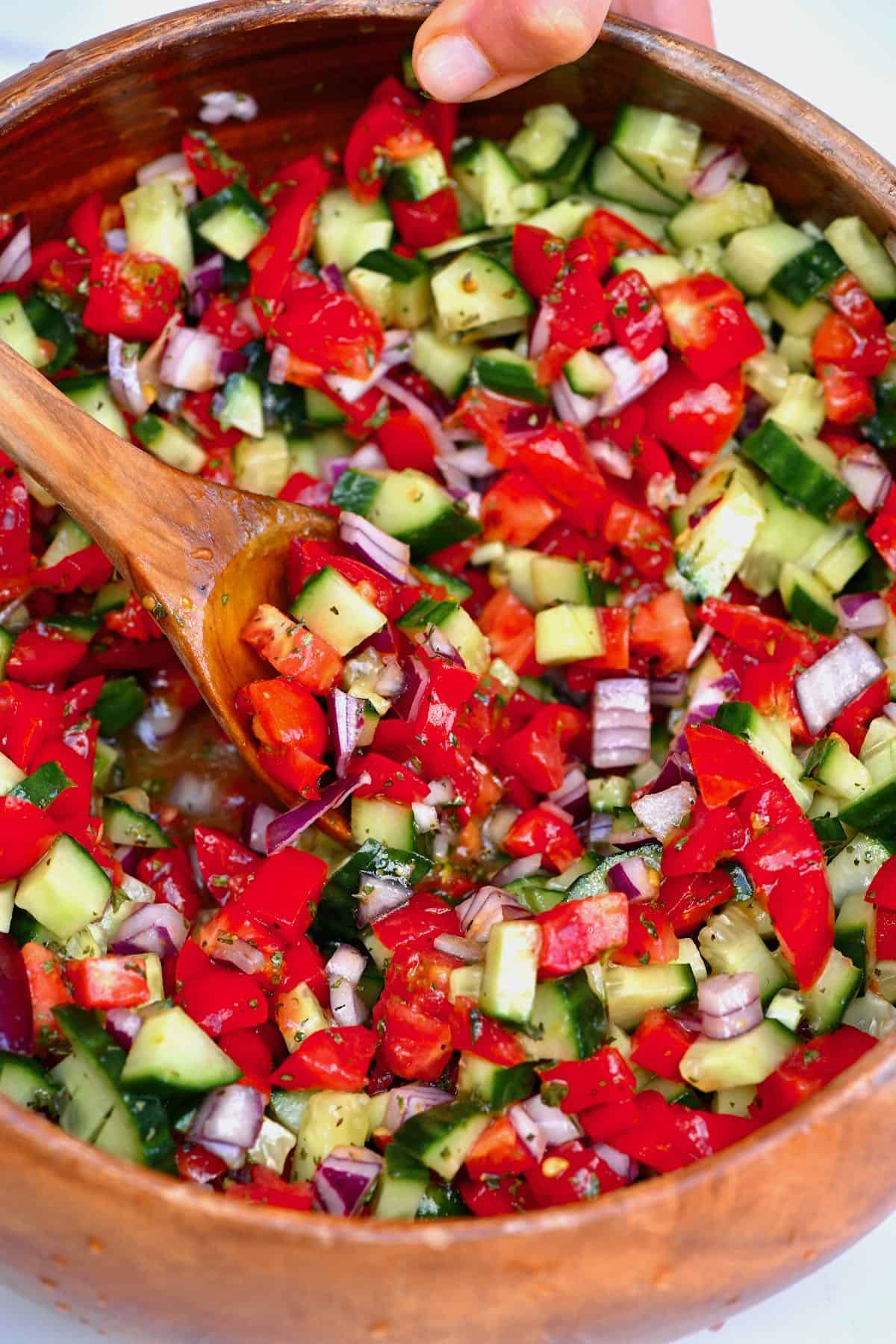
Having shared a simple cucumber and tomato salad with mint recently, you’re probably wondering what the difference is here, and I don’t blame you. However, this Shirazi salad has subtle differences that make all the difference!
These types of super simple, fresh salads are similar to what I’ve grown up with in Lebanon – like tabbouleh salad and fattoush salad! They make for the perfect appetizer or side. Best of all, this recipe takes just minutes to prep (and a little patience while it marinates)!
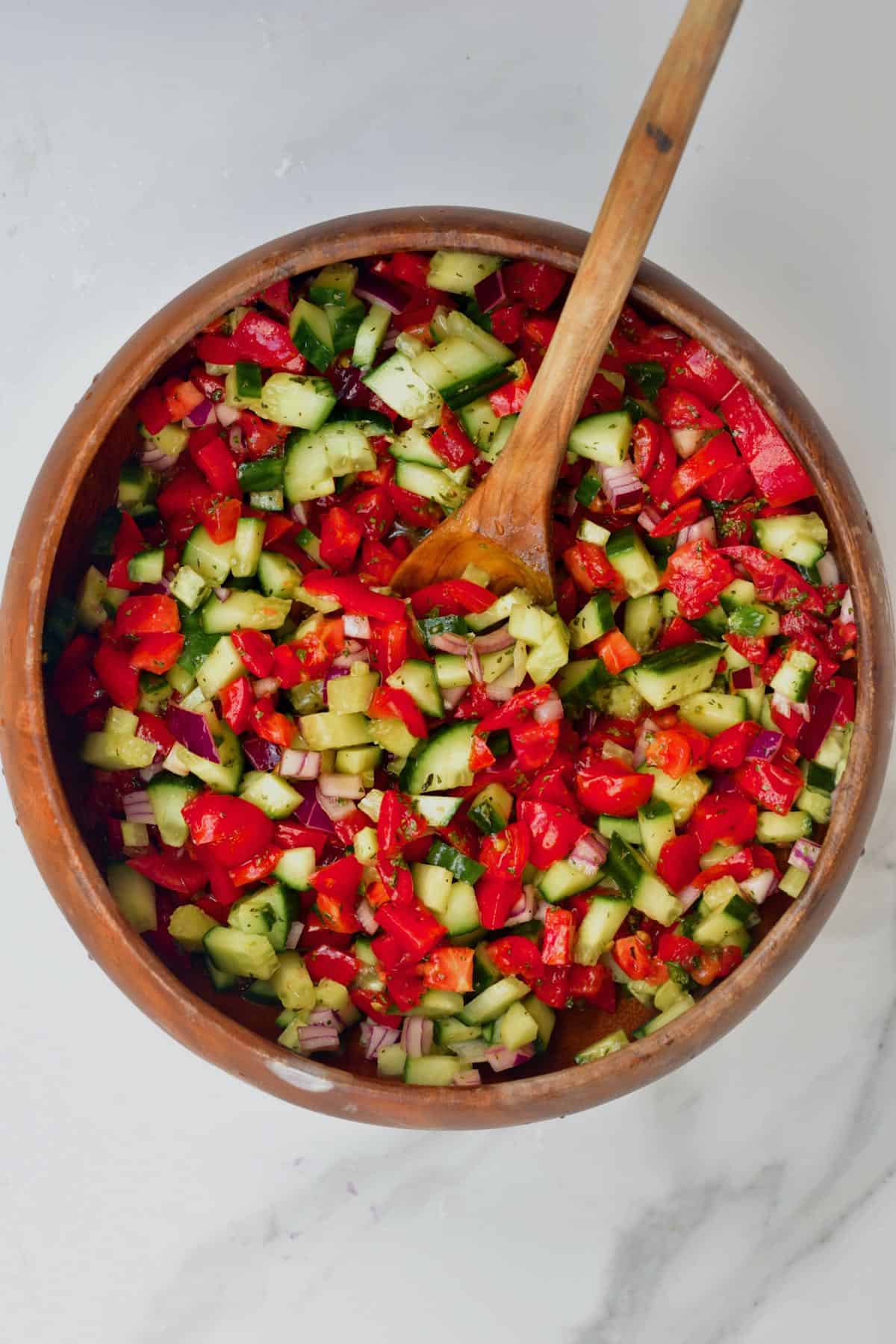
Want to save this recipe?
What is Shirazi Salad?
Shirazi salad is an Iranian-origin, simple, fresh cucumber onion tomato salad named after Shiraz in southern Iran. The fresh veggies are traditionally combined with olive oil, spices, verjuice (an acidic sour fruit juice), and/or lemon.
The resulting Persian salad makes for the perfect summery appetizer or side dish for kebabs, proteins, rice, etc. A little like the Persian “Pico de Gallo.”
Looking for more simple, fresh regional salads? How about this Lebanese fattoush salad, Italian Caprese salad, vegan Greek salad, or Asian cucumber salad (sunomono)!
The Ingredients
A traditional Shirazi salad is a simple cucumber onion tomato salad with salt and pepper and lemon/lime juice. But, for my version, I’ve added in a few “extras” for a Shirazi salad with a twist!
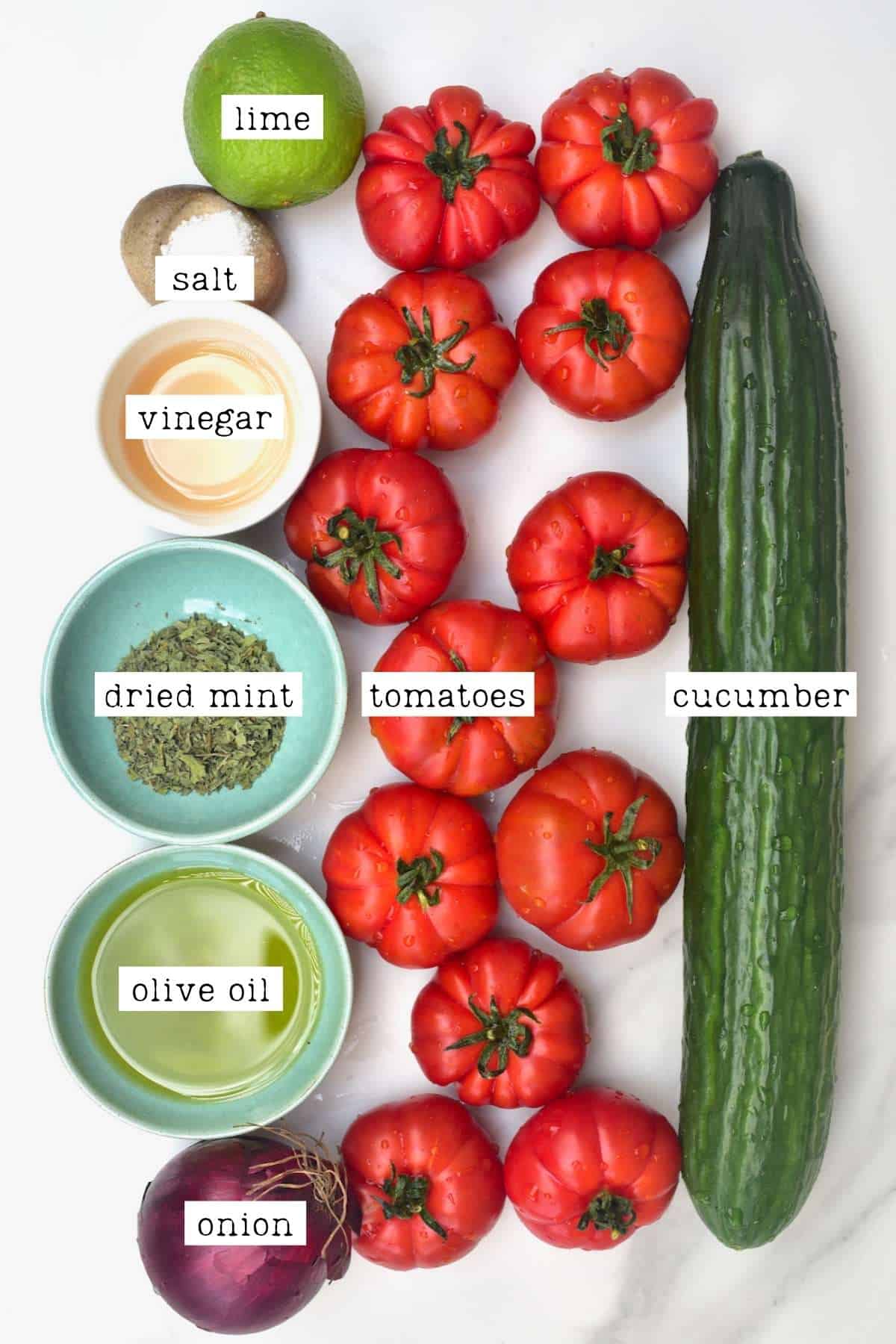
- Tomatoes: one of the key ingredients in this Persian cucumber salad – use ripe, flavorful tomatoes like vine-ripened, Roma, or heirloom tomatoes.
- Cucumber: it’s best to use Persian cucumbers if available; they contain fewer seeds for a less “watery” salad. However, you can also use English cucumber (with seeds or de-seeded). I recommend using 3-4 small Persian cucumbers to one English cucumber. Avoid cucumber with thick waxy, and somewhat bitter skin.
- Onion: I used a red onion, which is slightly sweeter. Feel free to reduce the amount if preferred. Alternatively, you could use shallots, which are slightly more mellow in flavor.
- Herbs: I used dried mint, which is traditional. However, you could also use a combination of fresh and dried. Alternatively, use parsley, dill, scallions, cilantro (definitely not traditional or common to Persian cuisine), or even a little Sumac.
- Olive oil: I recommend using a good quality extra virgin olive oil.
- Lime: or lemon juice – use fresh juice for the best results. You could also substitute this for sour grape juice (ab ghooreh/ab ghoreh) or verjuice.
- Vinegar: I recommend using a sweeter vinegar, like grape vinegar or apple cider vinegar.
- Salt: to taste.
Optional add-ins and variations
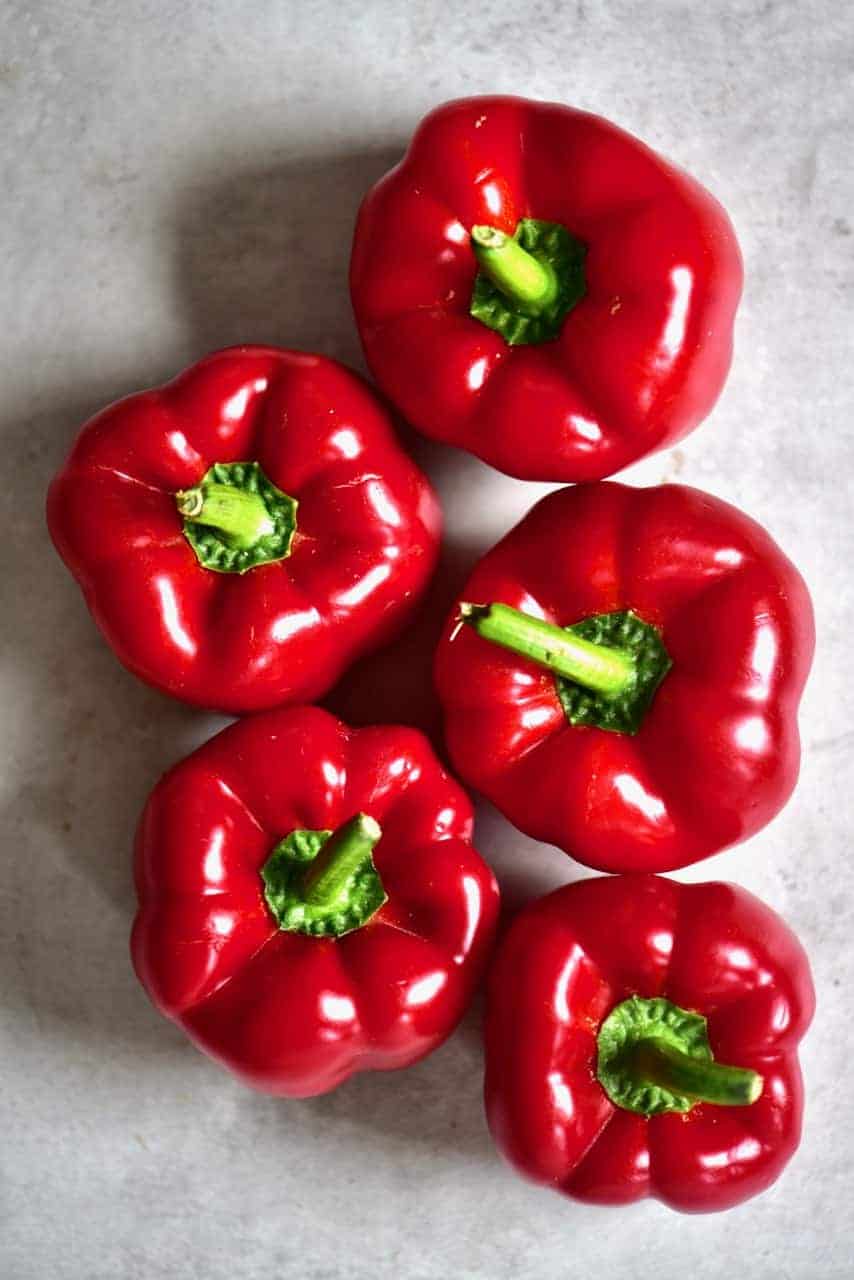
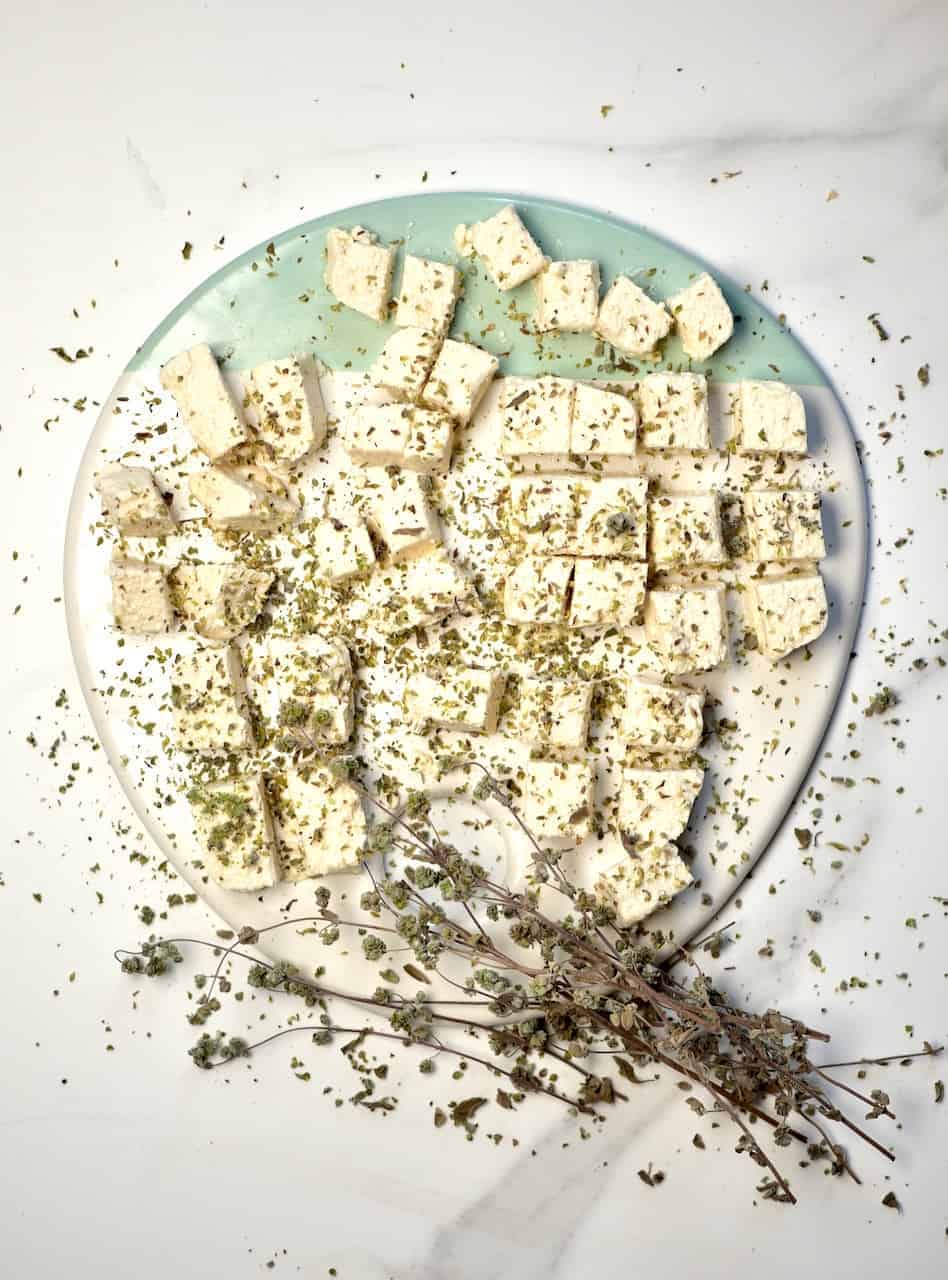
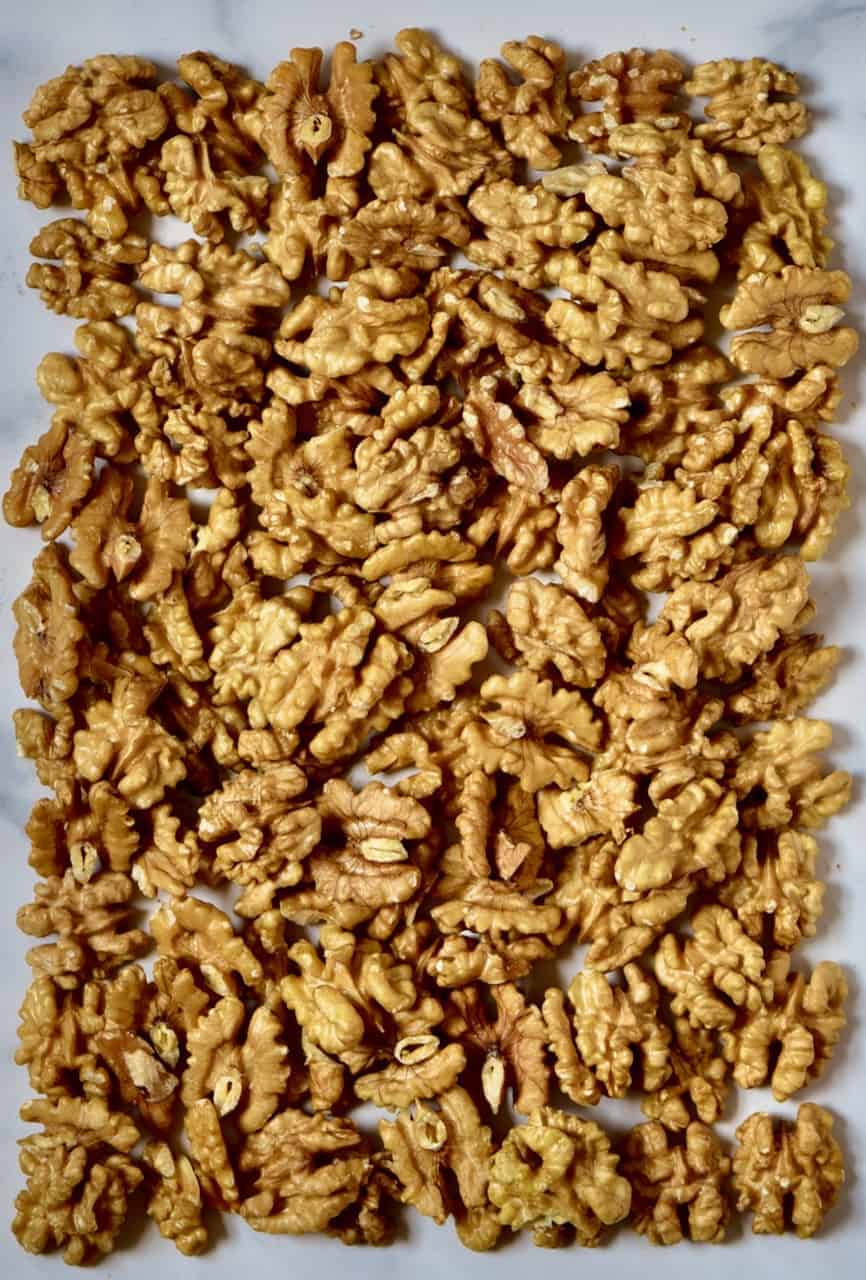
- Red or green bell pepper
- Feta (or vegan feta)
- Walnuts
- Dried rose petals
- Pomegranate molasses
- Avocado
- Chili
How to Make Shirazi Salad?
Step 1: Chop the vegetables
First, finely dice the cucumber, tomatoes, and onion. If your tomatoes contain lots of seeds, then first scoop out the seeds then finely chop them.
You could also use a “chopper” for the cucumber and onion, though the pieces won’t end up as uniform.
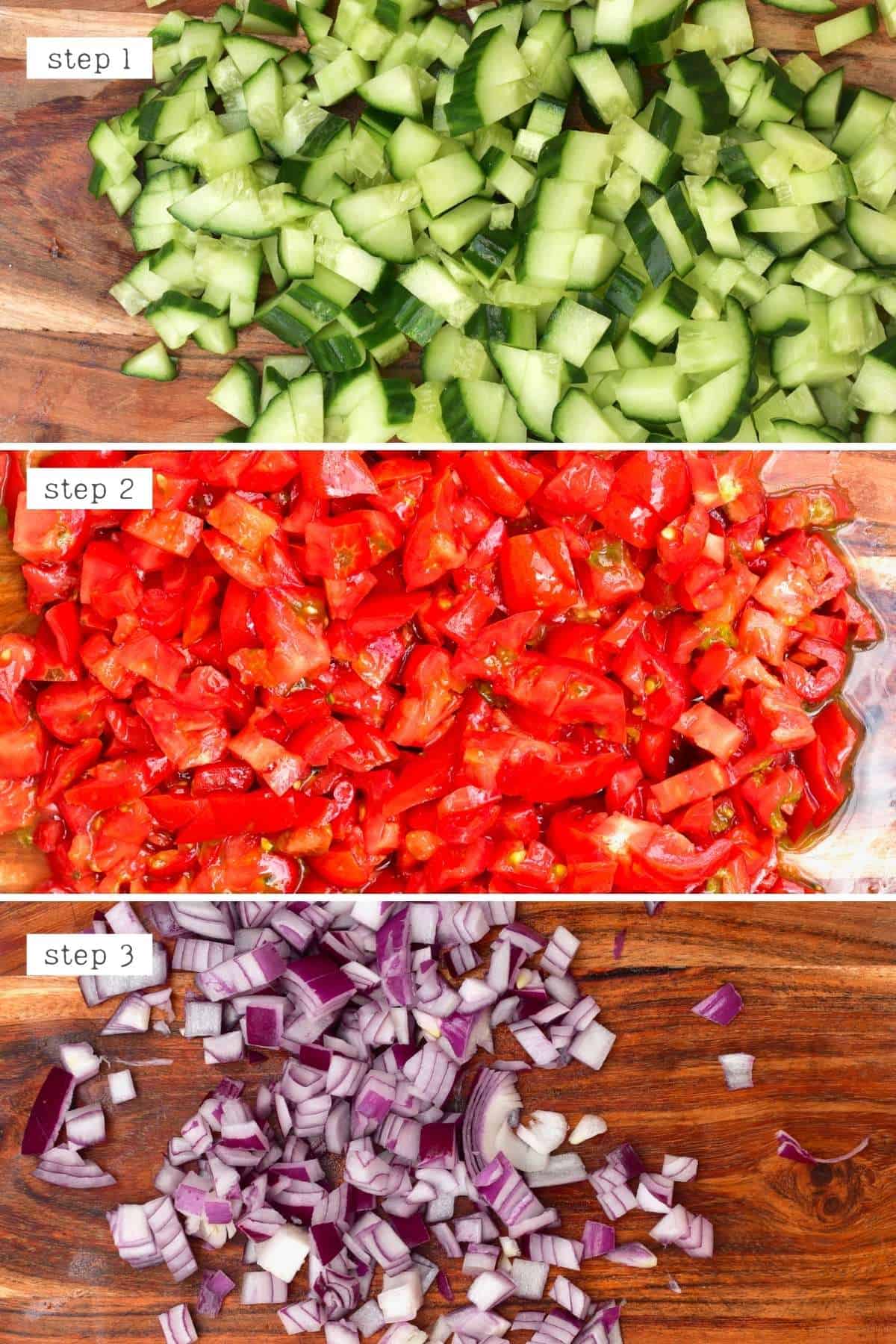
Step 2: Combine the ingredients and marinate
Add all of the ingredients to a large bowl and toss lightly to combine.
Then transfer the salad to the refrigerator for around two hours. This will help the flavors to meld and develop for a delicious Persian salad!
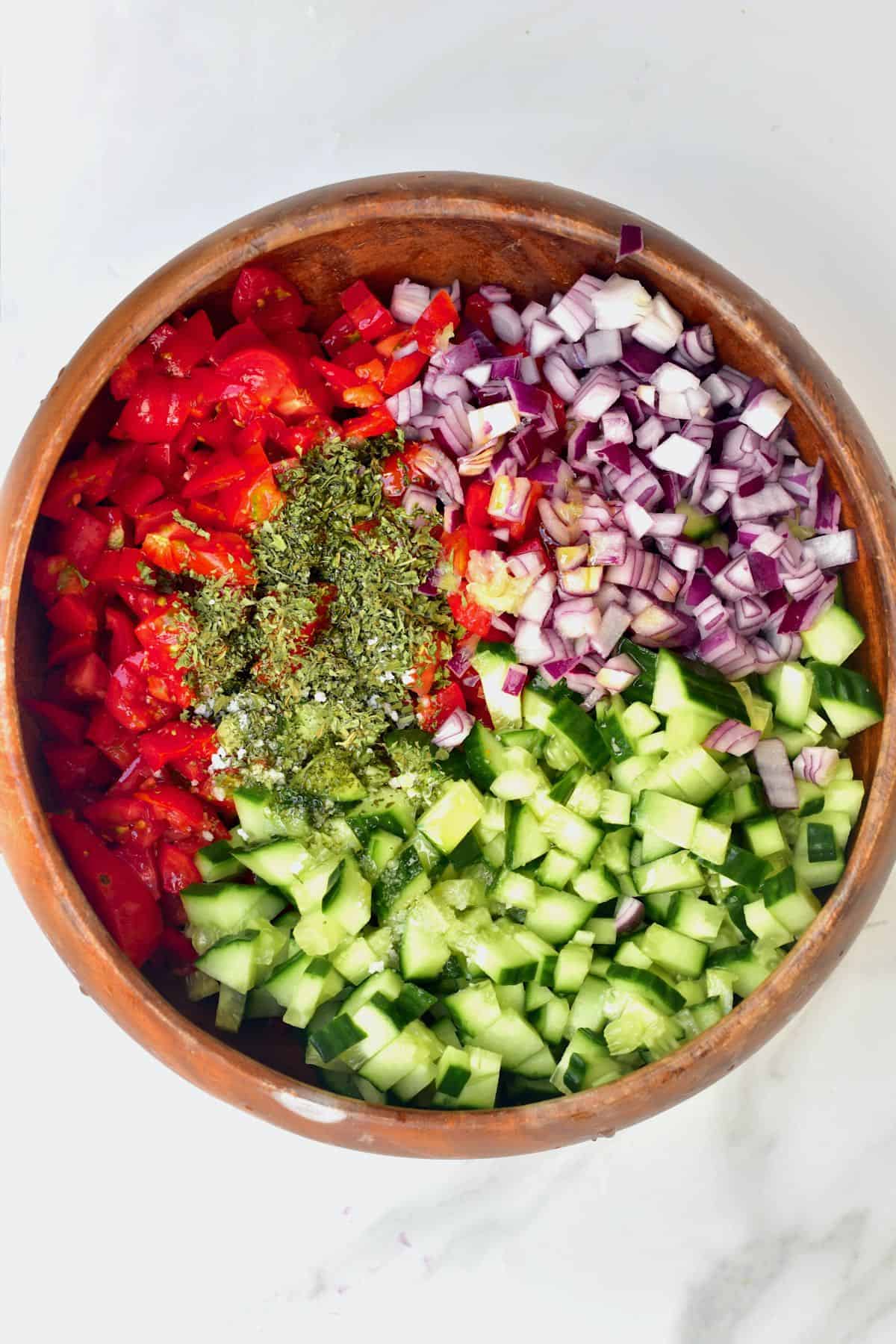
Before serving, taste the cucumber onion tomato salad and adjust any of the seasonings as necessary: add more salt, lime juice, vinegar, etc.
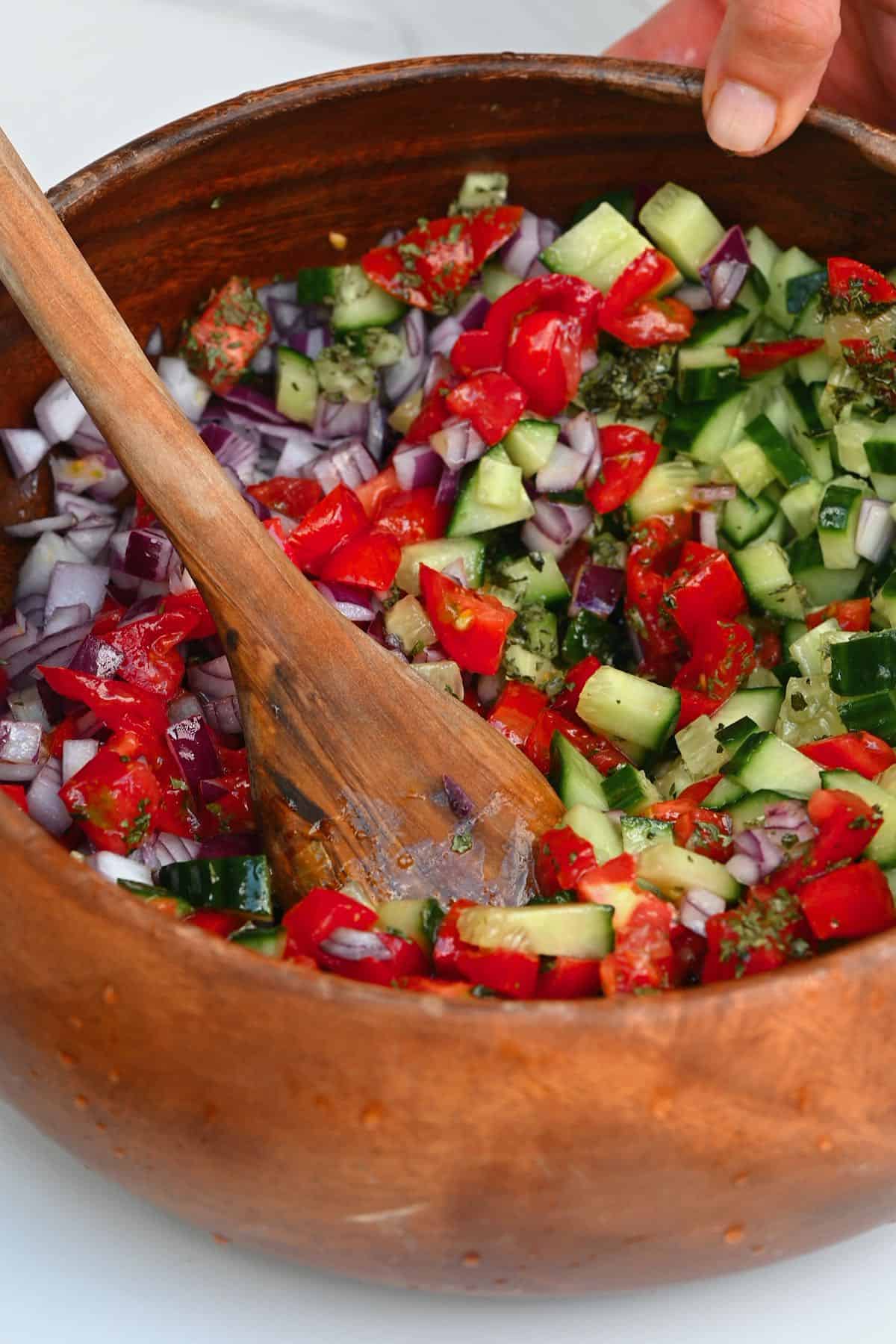
How to Store Persian Salad
I recommend enjoying this Persian cucumber salad fresh while the ingredients are still fresh and crunchy. However, leftovers can be covered and stored in the refrigerator for between 1-2 days.
Just note that over time the veggies will soften and release juices, thus softening the overall Shirazi salad.
Make ahead: if you plan on making this salad ahead, I recommend using seedless cucumbers, de-seeding the tomatoes, and also omitting the dressing and salt from the recipe until a couple of hours before serving. This way, it should last 3-4 days in the refrigerator – though still best within 2-3 days.
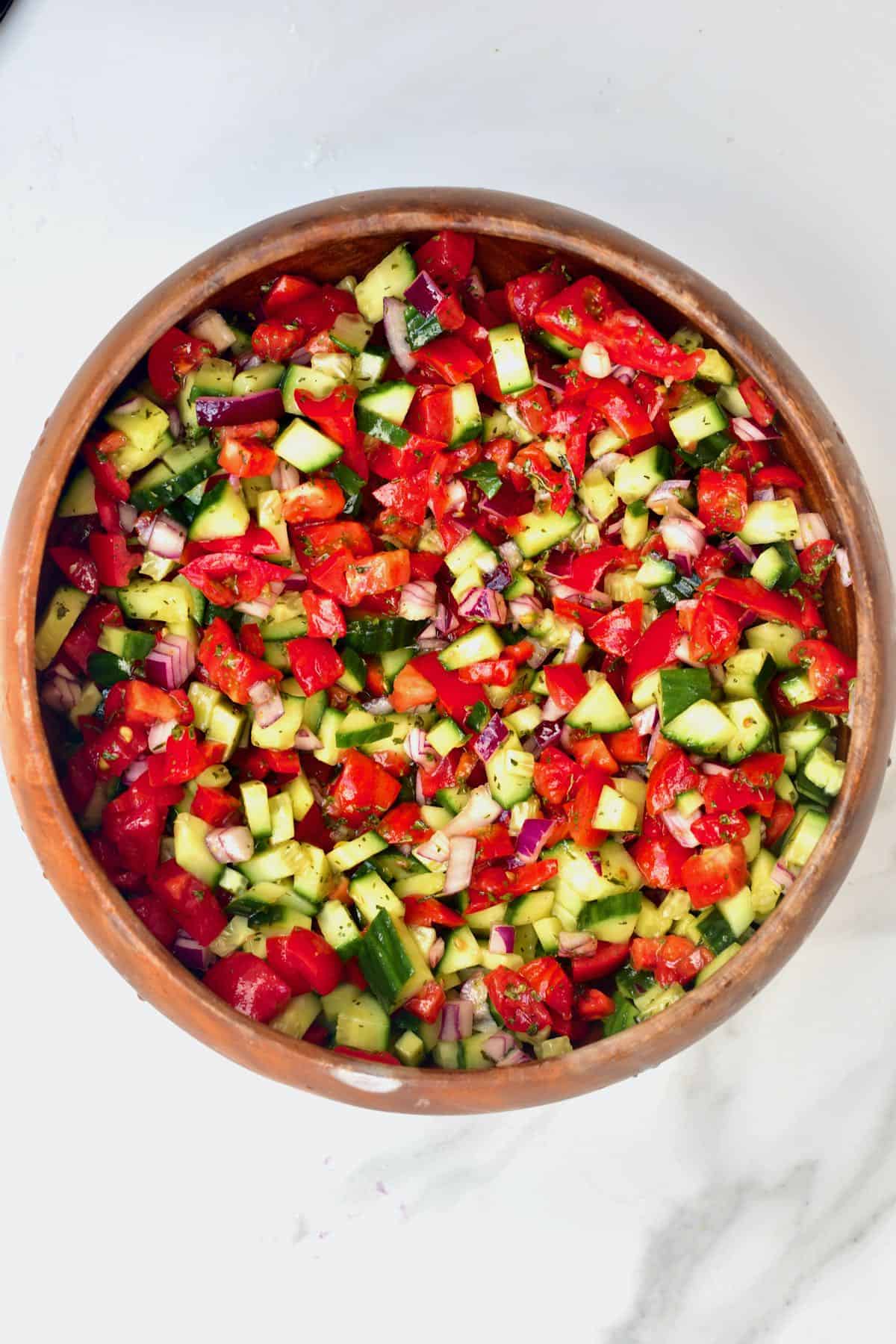
How to Serve Shirazi Salad
This Persian salad makes for the ultimate side dish, perfect for sharing alongside practically any meal you can think of. However, here are some of my favorite options:
- Serve with toasted pita bread as a simple appetizer.
- Add to wraps and sandwiches like this Eggplant and Halloumi Wrap.
- In falafel wraps and alongside falafels (authentic fried falafel or baked falafel) in nourishing salad bowls.
- Serve beside kebab, meat, fish, and other cooked proteins. I love it alongside this Lebanese Mansaf recipe.
- Serve up as part of a mezze platter alongside creamy hummus, borani, and other dips like beet and red pepper hummus.
Let me know in the comments how you’d serve this Persian cucumber salad.
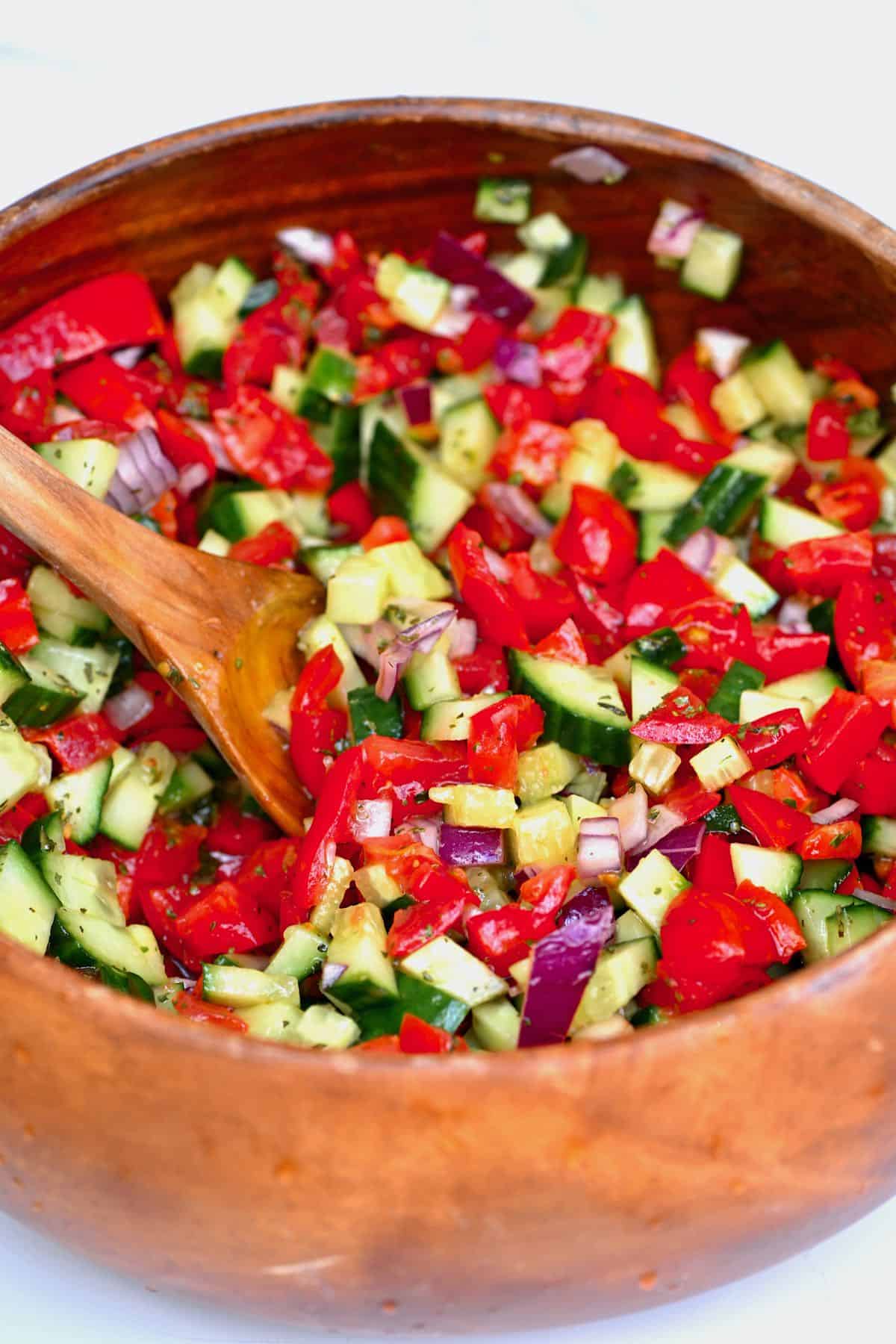
Recipe notes & variations
- Don’t forget to marinate: this simple Persian salad really benefits from the marinating time. The flavors all meld together and develop wonderfully.
- If your tomatoes are juicy: if your tomatoes are a little TOO juicy, you can either them cut in halves or quarters in a colander for a while. Alternatively, lightly salt the tomatoes first before leaving to drain for 15-30 minutes. This will help pull all the excess liquid from the tomatoes.
- Experiment with herbs: feel free to use a combination of herbs with the dried mint. I recommend adding a little parsley and a good pinch of sumac.
More healthy salad recipes
- Lebanese creamy cucumber yogurt salad (Kh’yar bi laban)
- Traditional Lebanese fattoush salad
- Simple Fatteh
- Traditional tabbouleh salad
- Simple Eggplant Salad
If you try this simple Shirazi salad recipe, I’d love to hear your thoughts/questions below. Also, I’d appreciate a recipe card rating below, and feel free to tag me in your recipe recreations on Instagram @Alphafoodie!
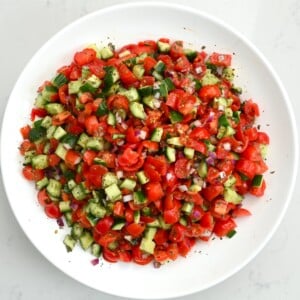
Shirazi salad
Ingredients
- 2 cups cucumber diced (about 1 large or 3 small Persian cucumbers)
- 2 cups tomatoes diced (about 4 medium tomatoes or 2 cups cherry tomatoes)
- ½ cup onion finely diced (about 1/2 medium red or white onion)
- 3 tablespoons extra virgin olive oil
- 2 tablespoons lime juice
- 2 tablespoons verjuice (sour grape juice) *
- 1 tablespoon dried mint
- Salt, to taste
Instructions
- Add the cucumber, tomato, and onion to a large bowl, then sprinkle over the dried mint and salt. Drizzle with olive oil and fresh lime juice (or verjuice if using).
- Toss everything together until evenly mixed.
- Let the salad rest for 10–15 minutes if you have time — it helps the flavors come together. Serve and enjoy!
Video
Notes
- * If not using verjuice, use 4 tablespoons lime juice instead.
- Let it rest: This salad really benefits from a short rest — even 10–15 minutes helps the flavors meld beautifully.
- If your tomatoes are extra juicy: You can chop and lightly salt them, then leave in a colander for 15–30 minutes to drain excess liquid.
- Shelf Life: 1 day (dressed), up to 3–4 days if stored undressed in the fridge.
Nutrition
Nutrition information is automatically calculated, so should only be used as an approximation.















This was my first time making this shirazi salad. And I absolutely love it! It is so light and refreshing. I can’t stop eating it. Thank you for sharing. Yum
So happy to hear this. Glad you liked it! <3